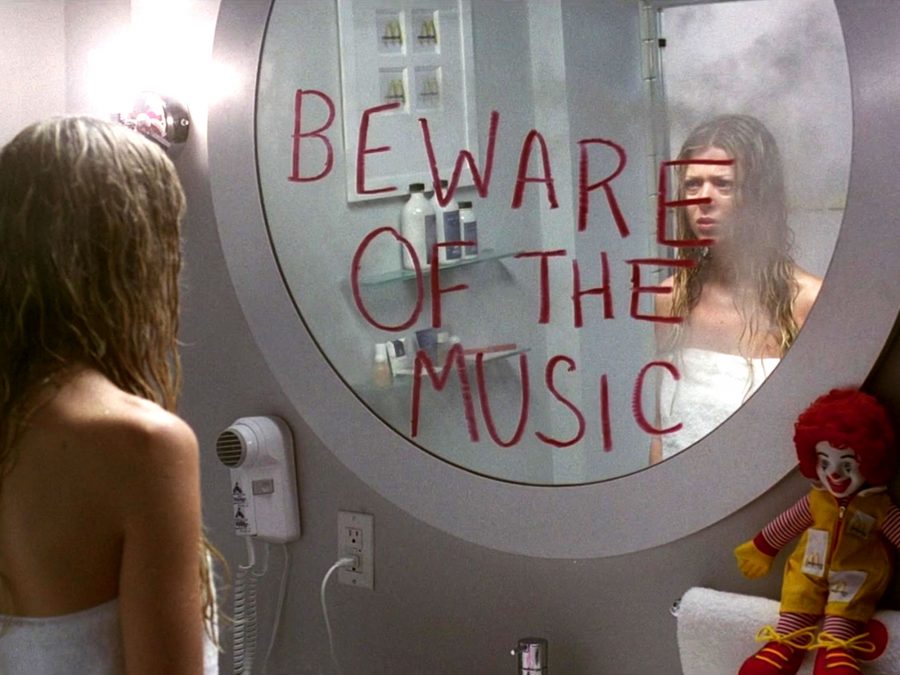Comprising four harmonising young men and cheeky innuendo, DuJour ticks the boxes for an early 2000s boy band. The members bicker, but reminders that “DuJour means friendship!” and “DuJour means teamwork!” resolve their squabbles. Embarking on a world tour, the band seems unstoppable – that is, until the members come to manager Wyatt (Alan Cumming), perplexed over a mysterious backing track on a new remix. Offering no explanation, Wyatt and the pilot parachute out of the band’s plane. “DuJour means seat belts! DuJour means crash positions!”
The changing definition of DuJour is played for laughs, but the joke reveals a key truth to Harry Elfont and Deborah Kaplan’s musical comedy Josie and the Pussycats, a hyperaware satire of Y2K culture that centres around a conspiracy between a major record company and the US government. Manipulated and marketed to sell endless trends, DuJour really could mean anything. Above all, DuJour means disposable.
Loosely based on the Archie Comics series of the same name, the film spotlights the eponymous band, made up of spunky lead singer/guitarist Josie (Rachael Leigh Cook), ditzy drummer Melody (Tara Reid) and driven bassist Valerie (Rosario Dawson). On the surface, the plot paints by numbers. The band unexpectedly skyrockets to fame; they clash when Josie seemingly eyes solo status; they make up and reaffirm their friendship. It’s all capped off with a stadium concert where Josie beseeches the audience to be true to themselves and snags a kiss from her cookie-cutter love interest.
Rather than a mean clique, however, the band square off against something far more insidious. Unbeknownst to the Pussycats, they’re DuJour’s replacements and the new central cog in an operation to control and exploit teenagers by planting sonic subliminal messages into popular music. Headed by Fiona (Parker Posey, having an absolute ball) and Wyatt, Mega Records and its Pentagon backers have been doing this for a long time, and DuJour’s plane crash is the latest ‘accident’ targeting artists who know too much.
Voiced by an ominous Mr Moviefone, the subliminal messages direct listeners to conform and purchase the latest fads, turning them into programmable cash dispensers. It’s a twist that turns decades of moral panic over the supposedly sinister influence of rock music and MTV on young people into a reality. Yet rather than blaming the musicians or the teenagers, the film condemns the corporations who stand to make the most profit.

Elfont and Kaplan satirise consumerism with glee, but there’s an awareness that they’re also targeting teens – after all, the film’s soundtrack sold over 500,000 copies. Josie and the Pussycats playfully skewers this irony by committing the same sins as Mega Records. Within the opening scene, no less than seven brands pop up in DuJour’s Target-themed airplane. This relentless barrage of faux product placement continues throughout the film, ranging from a 7-Eleven bowling alley to an Evian-branded aquarium. Wyatt breaks the fourth wall with knowing glances to make the meta joke clear.
Despite the film’s exaggerated tone, it’s never cynical enough to sacrifice the joys of cheesy teen fare, even finding space to celebrate the trio’s heartfelt dynamic. Still more euphoria comes from the indulgent music video sequences showcasing the delightful pop-rock produced by Babyface and Adam Schlesinger (‘3 Small Words’ especially is an earworm worth repeating). Where a lesser film might have made the Pussycats’ gullibility the butt of the joke, it’s telling that Wyatt nixes their suspicions by admonishing them on how other bands dream of taking their place – a chilling reminder of their expendability.
Ultimately, the cycle continues when the government official throws Fiona and Wyatt under the bus, escaping culpability. After he remarks that they discovered subliminal messages work better in movies anyways, text flashes across the screen proclaiming, “Josie and the Pussycats is the best movie ever. Join the army.” It’s a gag that’s downright prescient given the recent wave of military ties to Hollywood. Remember the Captain Marvel cross-promotional ads with the United States Air Force?
Against this backdrop, Josie’s final plea to let the music speak for itself is nothing less than an anti-capitalist rallying cry. Perhaps this helps to explain why Josie and the Pussycats initially flopped, making back less than half of its estimated $39 million budget. Yet the film’s themes have only grown more acute with age, and its subsequent cult status is fully deserved.
The proto-dystopian world of Josie and the Pussycats might seem far-fetched, but it’s closer than we think. Armed with data-driven advertising, corporations take every opportunity to further embed themselves in our lives. Our Twitter feeds can’t escape from overly friendly, curated brands cosplaying as real people. Such targeted ads might not be subliminal, but they carry that same insidious feeling of surveillance. Here’s hoping a McDonald’s skyscraper doesn’t hijack the Manhattan skyline next.
The post 20 years on, Josie and the Pussycats sharpens its claws appeared first on Little White Lies.
![Forest Essentials [CPV] WW](https://s3-us-west-2.amazonaws.com/pcw-uploads/logos/forest-essentials-promo-codes-coupons.png)
0 comments